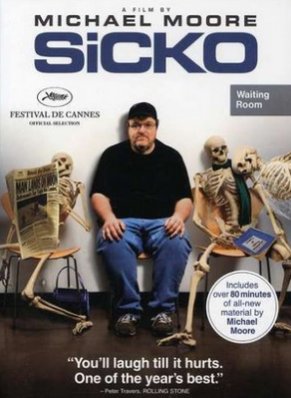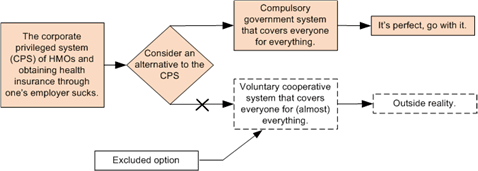Typical slicko Michael Moore fare still strikes nerve (7/10)
Written and Directed by Michael Moore
 Michael Moore: So there was actually one place on American soil with free, universal healthcare.
Michael Moore: So there was actually one place on American soil with free, universal healthcare.
[cut to aerial picture of Guantanamo Bay, Cuba]
Michael Moore: That’s all I needed to know.
To say that Sicko tugs at your heart strings is like saying an aircraft carrier leaves a wake. Moore is a master of both sob-story revelation and factual selectivity in the service of powerful messages, whether it’s corporate perfidy (Roger and Me), national politics (Fahrenheit 911)[1], gun policy (Bowling for Columbine), or health care issues (Sicko). Sometimes, as with the Charlton Heston footage in Columbine[2] the selectivity is outright fraudulent. But even when he crosses the line, Moore excels at generating sympathy for real people.
The primary technique for creating misimpressions that I’ve seen, however, in Moore’s movies and other mockumentaries from left or right, is to trick the emotional-perceptual mechanism. For example, the movie The Corporation I reviewed had a sequence describing a plant that was generating toxic waste… then during the narration we’re shown video images of white sludge coasting on dirty water. No attempt is made to connect this water to that specific plant, and most viewers see the vile image (perception) and have the immediate emotional reaction of righteous anger toward the owners of the plant… for which no actual evidence has demonstrated its culpability. It’s just pictures and feelings.
Michael Moore … Himself
George W. Bush … Himself (archive footage)
Bill Clinton … Himself (archive footage)
Richard Nixon … Himself (archive footage)
Hillary Clinton … Herself (archive footage)
Tony Benn … Himself
William Maher … Himself
Linda Peeno … Herself
Reggie Cervantes … Herself
Aleida Guevara … Herself
John Graham … Himself
So in Sicko, the viewer needs to be totally prepared for the tools of the master trickster. But also relish the down-to-earth humor and pathos of the grand drama that Moore is without equal in delivering. He is the absolute grandmaster of embarrassing the politically powerful in direct proportion to their venality. [A favorite that comes immediately to mind is from Fahrenheit (I think) where Michael manages to corral a US Representative and asks whether the rep has encouraged his own children to volunteer for the war on terror and head to Iraq.]
The general Michael Moore perspective
The following graphic shows how Michael Moore views the alternatives available to humankind for healthcare… and most other things:
 In other words, he does a fine job conveying the problems with our corporate-fascist system, then more or less glosses over any real objections to the compulsory government system and doesn’t consider a true voluntary coop system that might be the best alternative of all.
In other words, he does a fine job conveying the problems with our corporate-fascist system, then more or less glosses over any real objections to the compulsory government system and doesn’t consider a true voluntary coop system that might be the best alternative of all.
Back to the movie at hand…
But as for Sicko itself, the most compelling parts are the lampooning and harpooning of the USA’s “system” of health care. Any reasonable American with a heart is outraged by how we treat sick people in this country. It’s borders on the barbaric for those who do not have health insurance and borders on the atrocious for those who do (have health insurance). Michael Moore’s is a peripatetic Oprah.
The first half of the movie describes the plight of several Americans who either lack (enough) insurance or have insurance through HMOs that plot aggressively to deny coverage of their ailment. Such as Larry a senior union machinist and his wife Donna a small-newspaper editor. Larry has several heart attacks, then Donna contracts cancer. They’re insured, but between their copays and deductibles, they run out of money and are forced to move into their daughter’s storage room in Denver.
In early 2006, Michael Moore posted a note on the Web asking people to send him their health care horror stories. Within a week, he had received 25,000 responses. Probably the first case is emblematic (albeit not fatal): Doug Noe’s daughter was nine months old when they discovered she was going deaf. CIGNA would pay for the necessary implant operation to restore her hearing in one ear yet claimed it would not fund the operation for the other ear because it was “experimental.” [When CIGNA learned from Doug that Michael Moore would be doing a story, a high CIGNA officer called Doug stating the 2d operation would be granted.]
There are so many stories of coverage crimes like this it becomes difficult to watch. [And we’re not even talking about being rejected for preexisting conditions… where Sicko lists them from A to Z in a format like the opening text narrative of the original Star Wars (they go on and on forever). You can be rejected initially, but what’s really outrageous is the insurance company’s denial of coverage for a preexisting condition they subsequently “discover” when you actually make a claim.]
Probably the one case—for which murder charges against the insurance corporation are in order—that stands out for me is that of Julie Pierce and her husband Tracy who had a kidney cancer. The insurance company (First Health, associated with St. Joseph’s Hospital in Kansas City, Missouri, where Julie worked) denied payment for drugs, then denied for a bone marrow treatment that showed great promise… and he died. “He was my life.” Incredible. Major tears.
Making “the only alternative” look good…
The second half or the third third of the movie is all about showing how “absolutely wonderful” the national health care systems are in Canada, England, France, even Cuba. To tell you the truth, even discounting the rah rah and cherry picking—stories of waiting lists and millions of people seeking treatment for paper cuts—you know what? I’ll bet you dollars to donuts that the compulsory-government-socialist system is often or at least sometimes better for the average bloke than the government-corporate-fascist system.
Especially when we learn that the cost of life-saving drugs in Havana for Donna of Denver is pennies a month vs. $250 she had to pay in the States.
Thought provoking, heart-wrenching, uniquely Michael Moore funny. Personally, I see we can pull the voluntary coop pony from our current manure pile. Voluntarism in community is the solution.
###
[1] In the case of Bush, Moore pulls too many punches especially considering what was known then about 9/11 and certainly what is known now. But generally I find Fahrenheit 911 full of relevant facts about the Bush-Cheney/Saudi Arabia junta that other journalists didn’t care to touch.
[2] In one case, he took Heston’s speech to target; the problem was that the speech was in fact conciliatory and mild. So Moore spliced in footage from another Heston speech, cut out paragraphs, and spliced the beginning of one sentence to the ending of another. Moore made it appear Heston was an unsympathetic dolt with verbiage he delivered on a separate occasion.
This post has been read 1621 times!

